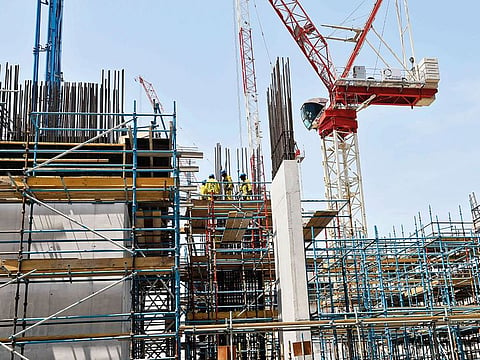UAE's construction workforce gets caught up job losses, unpaid salary and gratuity
Even big construction firms find they do not have funds to clear end-of-service benefits

Dubai: The workforce in the UAE construction sector is seeing more job losses as private sector led projects continue to drop significantly. It could get worse if real estate development, which is the prime driver of construction activity, does not pick up in the coming months.
But for that to happen, offplan sales will need to improve first – for now, these sales are running a distant second to demand for newly ready homes or those sold in the secondary market. While a handful of Dubai’s private sector developers have said they are considering new project launches, it won’t be enough to bring about a full scale revival of the construction sector and the fortunes of its workforce.
That’s not the only worry for the industry – while main and sub-contractors are shedding jobs, they are finding they don’t have the funds to pay off the gratuity. “There is a vicious pattern – months of no salary payment followed by termination, and then the endless wait for gratuity,” said the owner of a project services company in Dubai. “It’s happening at the big construction firms and down the chain.
“The only option left for those who have lost their jobs is hope the gratuity gets paid off eventually. Finding a new job immediately is next to impossible.”
Non-payment of gratuity
As per the current laws, a company should cancel an employee’s visa within a month or two and settle their end-of-service benefits on resignation/termination. But some employees are waiting for settlements for eight months and more as construction firms battle funding issues.
Getting tough
Now, even if they do get a job elsewhere, these workers need to get their visa cancellation from their previous employer. And this is where some construction firms are trying to drive a hard bargain, by telling their former employees that they will issue the release, but only if they drop all past claims against them. Even in those cases where salaries are pending for months and the affected employees have taken the legal route to get paid.
What does the law say?
UAE laws are explicit on the payment of gratuity and whatever it is that an employer owes its staff, existing or past. This applies to businesses that are in liquidation as well, which is the case with Arabtec, the UAE’s biggest contractor by some distance, which late last year finally decided going into liquidation is the only option left. It arrived at the decision after years or mounting losses crippled its situation, and which made it difficult for a new investor to come in and try and turn it around.
Even with a company in liquidation, worker rights are taken care of under the UAE laws. According to Hesham Elsamra, Senior Associate at the law firm Abdulla Alawadi & Associates, “Article 6 of the Labour Law regulates the entire financial rights of the worker up to a maximum of one year from the date of their maturity.
“It is necessary to proceed and take proper legal procedures without waiting for the appointment of a liquidator and announcing his name for fear of wasting time without benefiting. In all cases, they must file a complaint and demand the company for the sums owed through the judicial channels.”
Elsamra emphasises that affected workers should not waste any time and state their claims at the Ministry of Labour. This way, they also ensure that their right to be paid is “non-time barred from prosecution”.
Workers must go to the Ministry of Labour to file a temporary labour complaint. The matter will end once a liquidator is appointed, as all workers at this time must go and notify the appointed liquidator of their stalled duesHesham Elsamra of Abdulla Alawadi & Associates on options available for those workers when their company is in liquidation.
Liquidator takes control
In Arabtec’s case, the court will appoint a liquidator who will then work through the process of winding down the company. “After appointing the liquidator, he prepares a list of all the creditors, including the company's employees,” said Elsamra. “They are included among the company's creditors. According to their amounts, the sums obtained from the liquidation are distributed by dividing the liabilities in order of debts and creditors according to their amounts.
“In all cases, the workers are ‘senior creditors’ and have the same privileges as banks.”
For all those on the Arabtec payroll, that will indeed be some relief. But those at other construction businesses facing various degrees of cashflow issues, relief will come only when new project activity picks up. And no one has a clear line on when that will happen.
Sign up for the Daily Briefing
Get the latest news and updates straight to your inbox








